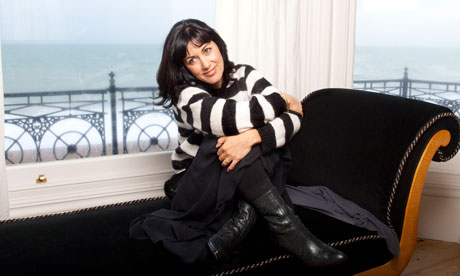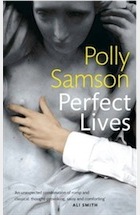Polly Samson's new book of short stories is called Perfect Lives, a rather provocative title, I can't help thinking, given the bald facts of Samson's life, which does, at a glance, seem pretty perfect. There's the millionaire husband – the thinking man's rock star, David Gilmour of Pink Floyd; the large family – four children of her own, four stepchildren; the lovely home – a vast cream stucco affair on the Hove seafront, as well as a rambling farm in Sussex and a mews house in London; not to mention financial security for life, and a well received novel and short story collection already to her name.
And then there's Samson herself, a quarter Chinese, half Jewish, looking a decade younger than she actually is (48), all glossy hair and gleaming skin, and regularly popping up in those irritating lists they have in magazines of the "Fifty Most Glamorous Women in the Universe" variety. In fact, it's all slightly irritating, on paper, at least.
Until I read the stories, and it's like pricking a balloon. Because in Samson's fictional world, perfection is just a trick of the light, a sleight of hand; it can be snatched away at any moment. Or else, the reverse: magicked out of thin air, assembled out of nothing more than a motley collection of imperfections and blind will.
What's more, the character of the first story in the book, Celia Idlewild, whose perfect life is really not so perfect, seems to live in Polly Samson's own house. There it is in the story "standing tall and creamily stuccoed above the beach like a lone tooth", and there it is, just as tall and creamily stuccoed when I pull up outside, a towering Victorian cliff of a house buffeted by blasts of wind off the Channel, seagulls screaming overhead.
But then I've already begun to suspect that "Polly Samson", the perfect rock star wife, is herself something of a fictional creation, and that the actual Samson might be a far more interesting character. Inside, on the sofa, with a view over the beach and gulls, I wonder aloud if the short stories – a collection loosely linked by characters in and around this house – was a response to people who say: "Oh, she must have a perfect life."
"Well it's never the whole story, is it? I don't know how to answer that. My perfect life at the moment would be working for WikiLeaks."
WikiLeaks?
"I just look at Julian Assange and what he's doing and I'd love to be doing something like that. Being strong and brave and actually doing something that will make a difference. Do I think my life is perfect? No."
It's not quite the answer to the question but she says she's not exactly sure where the germ of the idea for the collection came from. The crack in Celia Idlewild's dream life is discovering her husband has a secret child. "And it did used to be one of my nightmares that suddenly David would have all these other children. Because it wouldn't have been that unlikely. I remember there was a time when I had this dream that he had another child to look after and he already had four children which I felt was quite enough. That same day he got a call saying that this child had turned up in LA and the dates sort of fitted so he had to get someone to check it out. In the end it turned out to be a nutter but we did have a moment of thinking, 'Oh no.'"
It's a slightly uncanny experience talking about Celia Idlewild in Celia Idlewild's house, with what looks like Celia Idlewild's grand piano in one corner of the room, and Celia Idlewild's view over the beach from the windows. I feel like I'm in the book, and keep having vague flashbacks, and it turns out that I'm not the only one. Because Samson wasn't actually living in the house when she wrote it. "We'd just bought it, and I started trying to imagine the sort of woman who'd live in a place like this long before I'd fully accepted that we were going to be living here."
Whatever else she is, Samson is not Celia Idlewild. She's much warmer, she chats, she jokes, she divulges scurrilous gossip about her husband's rock star friends. There's something reassuring about the fact that life hasn't always gone entirely her way. She was an abandoned 26-year-old single mother working as a jobbing journalist when she met Gilmour. And while I watch a video on her website in which she appears as the epitome of grace and poise, her reaction to being published again, after a gap of 10 years, is quite winningly graceless and poiseless. She's been nervous "to the point of lying on the floor crying. I don't know what's wrong with me. It should be a joy, shouldn't it?"
But you've had nothing but positive reviews, I say. The jacket is littered with quotes. ("An unexpected combination of romp and classical: thought-provoking, sassy and comforting," Ali Smith. "These intertwined, silken stories deftly expose the heart-sickness behind so many of the burnished surfaces of contemporary life," John Banville.) And she's already been a runner-up in the VS Pritchett Memorial Prize for best short story for one of this new collection.
"But have you seen Amazon? Ms Felicia Double-Barrelled of Staines has told the world with two stars that I have written a book about being Mrs David Gilmour. Which I really take exception to because: a) I'm not called Mrs David Gilmour; and nowhere on my book does it say who I'm married to; and it's not as if I'm trading on being Mrs David Gilmour."
It's a double-edged sword, being a rock wife. But then, if anybody knows about publicity and marketing – its pluses and minuses – it's Samson. Before she became a writer, she worked in publishing, as the publicity director for Jonathan Cape, working with the likes of Martin Amis and Ian McEwan, flitting in and out of the Groucho Club, and inevitably she's entirely aware about her marketability as an author. And yet it doesn't stop her saying, poignantly, toward the end of the interview: "Isn't that the tragic thing about the world we live in? That everything needs a celebrity. Everything. I mean you probably wouldn't be interested in me now without it. Would you?"
She's right, of course. The rock-star connections give her a lustre that other writers, particularly those writing hard-to-sell short stories, struggle to match. But it is also unfair in that she's a fully fledged writer in her own right. And Samson's background is a match for anything rock can throw up. Her mother, the offspring of a Chinese businessman and a cockney chambermaid, left China aged six, returned to China aged 16, became a soldier in the People's Liberation Army – had one child by a Filipino general, another by a British journalist at the Communist paper, the Daily Worker, a third, Polly, by Lance Samson who also was a Daily Workerjournalist– living in China, Korea and East Berlin before finally returning to the UK. "Where she became the headmistress of a village primary school. And my father edited local papers … And of course I didn't really realise any of this. My mother didn't talk about anything until she wrote a book. Because, I think, she was quite traumatised. I had no idea that she'd been a major in Mao's army. I wasn't that interested. As a child, you're not."
She only began to realise something of what her mother had been through "when they started making documentaries about her". It's an extraordinary tale, and she's very close to her parents now, but it doesn't sound like the happiest of childhoods.
"They didn't really know what parents did because they'd both had these very traumatic ends to their family lives when they were young. They were both displaced. They both arrived in 1938 in England. My mother was six and had been displaced by the Japanese invasion; my father was sent on the Kindertransport after his father had died fighting. My mother was brought up in a Barnardo's home and then fostered in the Midlands… where terrible things happened to her. My father's mother had to go to work as a matron in a school. All the children were in different places. They never lived as a family again."
The reverberations seem to have echoed into the next generation. Samson bunked off school from the age of 14 and was "quite a sad teenager". And throughout her stories, there's a sense of loss and displacement, most obviously when one of her characters, a Jew, goes in search of her vanished relatives in Hamburg, where Samson's relatives also lived and "where second-hand memories were blowing around the streets like litter".
And then there's Leszek, the brilliant concert pianist, who chooses to ignore the daughter he's fathered. It's hard to ignore the fact that there's a "Leszek" in Samson's life, too: the poet Heathcote Williams. They had a relationship, and then had a son – her eldest, Charlie. They were living in a cottage on the vast Cornish estate of Williams's friend, Peregrine St Germans (where the Port Eliot literary festival is now held), when Williams had a breakdown.
"And this came as a great surprise to me although I don't know why because he'd had many others before. He had a history of not being able to cope with life. And it was sort of devastating. We went from being with each other 24 hours a day, laughing, high as kites, baby, madly in love, to literally one night, he was gone. And I can remember going to the main house and finding Peregrine and he said: 'You've got to leave him alone, he's having a breakdown. You can't expect him to play Daddy Bear, Mummy Bear and Baby Bear for ever you know.' It was just awful."
She moved back to London and freelanced to support herself and the baby and then, through mutual friends, she met David Gilmour and they've been together ever since. Gilmour adopted Charlie, then two, now nearly 21, although he's now just starting to get to know Heathcote Williams.
They have three other children, Joe, 15, Gabriel, 13 and Romany, 8, who combined with David's four children from his previous marriage make eight. "But then I always did like The Sound of Music," she says. It's hard not to think of this as another reverberation down the generations, a reaction to her own lonely childhood, another cycle of consequence, as the short stories are in their way too. But Felicia Double-Barrelled of Staines is wrong. The stories aren't about the life of Mrs David Gilmour. They're more subtle and complex than that; an echo chamber of cause and effect, and art and life, and life and loss.

